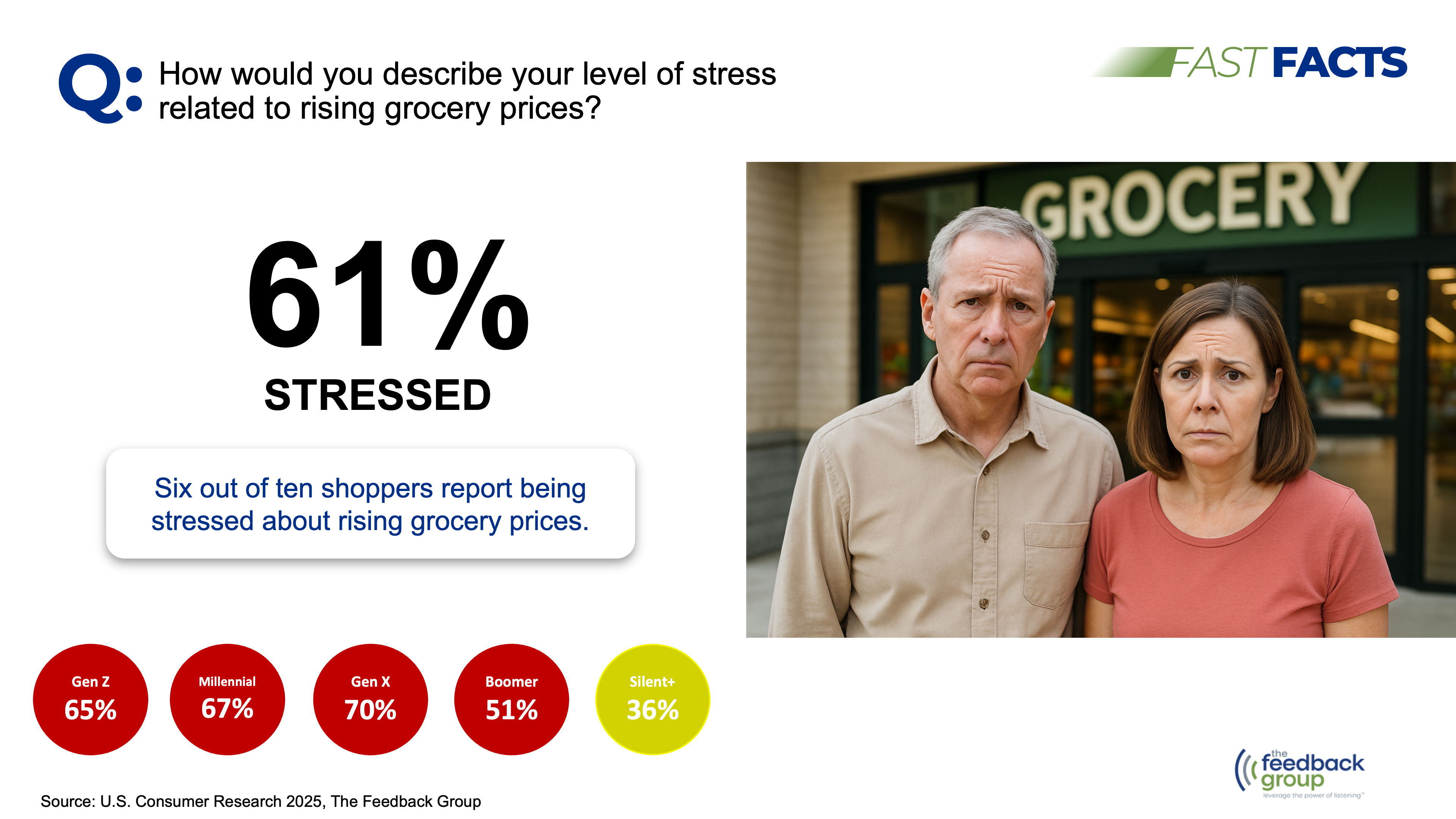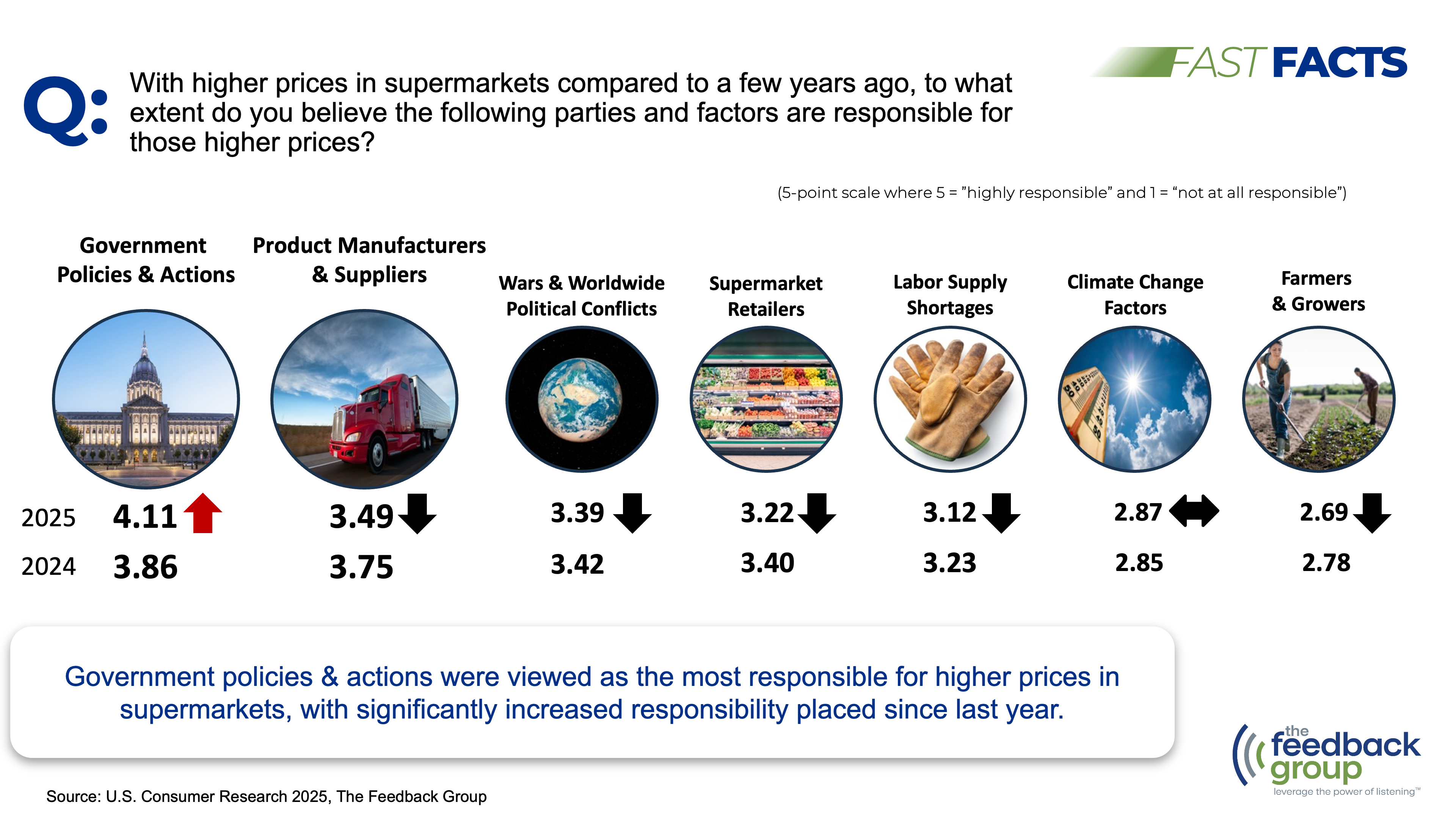
LAKE SUCCESS, NY , June 05, 2025 (GLOBE NEWSWIRE) — The Feedback Group, a leader in delivering actionable stakeholder insights, today released findings from its latest national research study, “Supermarket Shoppers:Rising Prices, Inflation, and Tariffs” This in-depth research explores shopper perceptions surrounding prices, inflation, and tariffs, and how these concerns are impacting consumer behavior in supermarkets.

Rising prices, inflation, and tariffs create stress for supermarket shoppers.
Stress and Strategic Trade-Offs Mark the Current Grocery Experience
A significant 61% of U.S. supermarket shoppers report feeling stressed about rising grocery prices. This stress is especially pronounced among younger and middle-age shoppers—Generation X (70%), Millennials (67%), and Gen Z (65%). Reflecting this tension, shoppers continue to adapt, employing a range of inflation-fighting strategies. Top tactics include buying more items on sale (62%), eating more often at home (50%), buying more store brands (42%), and using a store’s weekly sales flyer (40%).
“Shoppers are clearly under pressure, and the emotional toll of rising grocery prices is visible across the generations,” commented Doug Madenberg, Chief Listening Officer at The Feedback Group. “Our research underscores the balancing act many consumers face in the supermarket aisle today.”
Shoppers Point to Government Policies as Most Responsible for Price Increases
When asked about the factors contributing to higher supermarket prices, shoppers once again pointed to government policies and actions as the most responsible (mean score 4.11 on a 5-point scale), a notable increase from 3.86 in 2024. Factors following government policies and actions were product manufacturers and suppliers (3.49), wars and worldwide conflicts (3.39), and supermarket retailers (3.22). Farmers and growers were viewed as least responsible (2.69).
Brian Numainville, Principal at The Feedback Group, noted, “Consumers continue to believe that external factors—particularly government policy and suppliers—are driving price hikes more than the supermarkets themselves. These perceptions are intensifying over time.”
Tariff Awareness is High—So Is Concern
The study found that 95% of shoppers were already aware of proposed tariffs before being surveyed. Among tariff-aware shoppers, many expressed concern that tariffs would impact their grocery bills, with nearly half (47%) saying they were “very concerned.” A majority (83%) expect tariffs to increase prices—49% believe prices will rise significantly and 34% somewhat.
Shoppers expect a broad range of categories will be affected by tariff-related price hikes, most notably international and imported foods (88%), followed by fruits and vegetables (79%), household items (67%), packaged or processed foods (65%), and meat and poultry (63%).
Private Labels and Promotions Gain Ground as Shoppers Prepare for Tariff Fallout
If tariffs lead to higher prices, shoppers say they are most likely to switch to store brand or lower-cost items (41%), use more coupons or promotions (35%), or buy fewer groceries overall (34%). Notably, eight in ten shoppers already believe private label prices and quality compare well to national brands.
Retailers Must Strengthen Communication Around Inflation and Pricing
While most shoppers remain satisfied with their overall supermarket experience, the research reveals a communication gap. Shoppers gave supermarkets relatively low ratings for being on their side when it comes to inflation (3.34), explaining price increases (2.97), and discussing tariff impacts (2.46).
As a result, shoppers continue to significantly overestimate supermarket profits, believing them to be, on average, at 30% when the reality is net profit margins actually register in the 1–3% range. This perception has persisted for years.
“Supermarkets have an opportunity to enhance transparency with their shoppers,” concluded Madenberg and Numainville. “Clearer communication around price drivers can help rebuild trust during uncertain economic times.”
The research findings are available to supermarket retailers, distributors, and food industry companies. Please visit The Feedback Group’s website for more information.

Government policies and actions are viewed as the most responsible for higher prices in supermarkets, increasing significantly in the last year.
About The Feedback Group
The Feedback Group offers a broad spectrum of research, consumer insight, and consulting services. As a 360-degree listening partner, The Feedback Group provides services include employee experience assessments, customer satisfaction programs, and consumer perception studies, as well as national, regional, and local shopper studies. For more information, visit feedbackgroup.com.
Press inquiries
The Feedback Group
https://feedbackgroup.com/
Brian Numainville
[email protected]
516-829-4200 ext. 115

Wall St Business News, Latest and Up-to-date Business Stories from Newsmakers of Tomorrow


